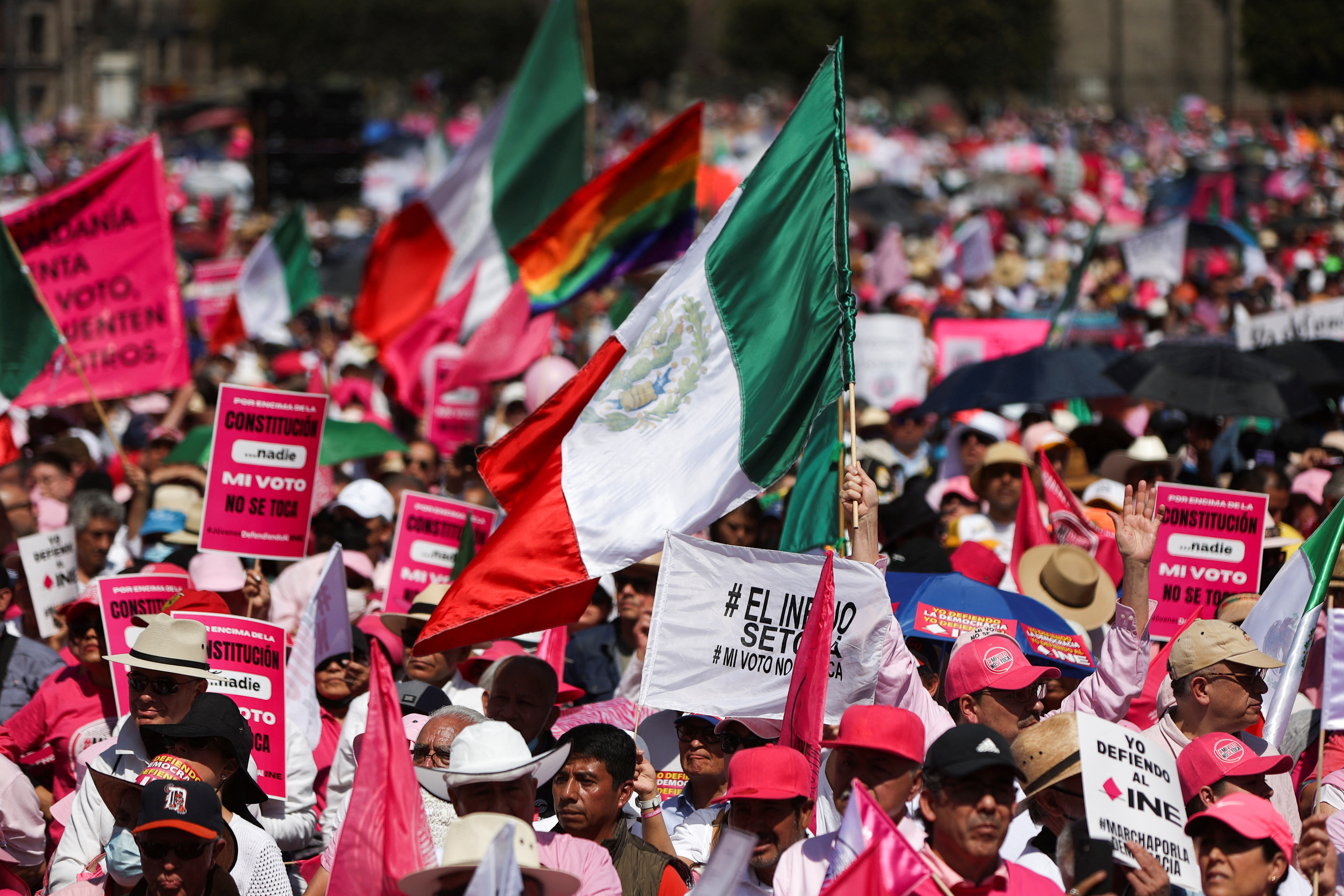On June 2nd, over 60 million Mexican voters participated in a monumental election, choosing not only a new president but also members of Congress, nine state governors, and numerous local officials. The ruling Morena party, along with Claudia Sheinbaum, the hand-picked successor of outgoing President Andrés Manuel López Obrador, achieved a resounding triumph. Sheinbaum’s election as Mexico’s first female president, securing the highest percentage of votes since the country’s democratic transition in 2001, grants her considerable power to steer Mexico’s trajectory, including the ability to enact significant constitutional reforms. However, this overwhelming victory masks underlying complexities and critical challenges concerning security and the rule of law that Mexico must confront.
Sheinbaum has pledged to continue López Obrador’s “Fourth Transformation,” a socio-political project aimed at economic empowerment for Mexico’s marginalized populations, but which also entails a noticeable weakening of democratic institutions. A crucial question remains whether Sheinbaum will demonstrate greater resolve and effectiveness than her predecessor in tackling the pervasive organized crime that plagues Mexico – a problem seemingly given free rein under López Obrador’s administration. Perhaps the most immediate test of Sheinbaum’s leadership will be her approach to the constitutional reforms initiated by López Obrador, reforms that strike at the heart of Mexican democracy, even before she officially assumes office.
A Decisive Victory for Morena
Claudia Sheinbaum’s election victory was emphatic, capturing nearly 60% of the popular vote and significantly outdistancing her two main rivals. Morena, in coalition with the Green Party and Workers’ Party, secured a two-thirds majority in the Chamber of Deputies and fell just two votes short of a supermajority in the Mexican Congress. This near supermajority means that while passing constitutional reforms is within reach, Morena will need to garner the support of just a couple of senators from other parties to achieve this goal. The fluidity of Mexican politics, characterized by chapulines (grasshoppers) – politicians known for switching party allegiances for personal gain – makes this entirely possible. Morena itself has historically attracted numerous defectors from established parties.
 Claudia Sheinbaum celebrating her presidential victory in Mexico City's Zocalo.
Claudia Sheinbaum celebrating her presidential victory in Mexico City's Zocalo.
Morena’s dominance extended to state level elections, winning seven out of the nine governorships contested, even in regions traditionally held by opposition parties. This expands Morena’s control to 24 out of 32 governorships nationwide, including the influential Mexico City governorship. This widespread control presents Sheinbaum with a unique opportunity to implement her agenda across federal, state, and municipal levels, fostering a level of intergovernmental coordination that has long been lacking in Mexico.
However, Morena’s very success could become a significant challenge for Sheinbaum. Firstly, questions arise about her ability to effectively manage the diverse and often discordant factions within Morena, a party composed of political opportunists with widely varying agendas.
Secondly, the looming presence of her mentor, López Obrador, cannot be ignored. His continued influence within Morena could cast a long shadow over Sheinbaum’s presidency, particularly if he seeks to maintain control over policy direction. Significantly, Sheinbaum could face a recall referendum in just three years, a mechanism created and utilized by López Obrador himself. This referendum, allowing for the removal of a sitting president with sufficient citizen demand and 3 million signatures, could be exploited by López Obrador to curb any independent policy initiatives Sheinbaum might pursue that diverge from his preferences.
A Mixed Bag: Progress and Persistent Problems
The 2024 election marked a historic moment with two women leading presidential candidacies – Sheinbaum for Morena and Xóchitl Gálvez for the opposition. This milestone reflects the success of Mexico’s parity laws in promoting female participation in politics over the past two decades. However, this political progress contrasts starkly with the persistent challenges women face in Mexico, notably the alarmingly high rate of femicides, with approximately nine to ten women murdered daily. Sheinbaum has pledged to address violence against women, pointing to her establishment of a special prosecutor for femicides during her tenure as Mexico City mayor (December 2018 to June 2023). This contrasts sharply with López Obrador’s contentious relationship with Mexico’s feminist movements.
 Vanda Felbab-Brown, expert on Mexico and organized crime, discussing the implications of the 2024 Mexican elections.
Vanda Felbab-Brown, expert on Mexico and organized crime, discussing the implications of the 2024 Mexican elections.
The emergence of primary-like selection processes for both leading candidates was another noteworthy development. These “primaries” were a novelty in a Mexican political landscape where parties traditionally relied on closed-door methods for selecting leaders and candidates. López Obrador’s unexpected announcement of a primary-like process for Morena in 2023 spurred the opposition to follow suit.
These “primaries” introduced a degree of transparency and popular mandate to the selection of top political figures, a welcome change. However, the lack of formal regulations and the widespread disregard for electoral authorities demonstrated by Mexican political parties during these primaries also highlighted a fundamental and ongoing issue in Mexico: the weakness of the rule of law. Furthermore, the primaries exacerbated existing political divisions in a country already deeply polarized.
The elections solidified the reshaping of Mexico’s party system. Morena, a relatively new party established in 2014, cemented its dominance, propelled by its social welfare policies and López Obrador’s charismatic appeal. The party continued to attract both new voters and political operatives. Morena’s success also benefited the traditionally weak Green Party, elevating it to the second-strongest force in the Chamber of Deputies.
Conversely, Mexico’s established parties – the Institutional Revolutionary Party (PRI), the National Action Party (PAN), and the Party of the Democratic Revolution (PRD) – continued their decline. With the exception of Guanajuato state, they lost every gubernatorial race contested, even in traditional strongholds like Yucatán. Their failure to address past misdeeds and offer a compelling vision for the future left Mexican voters uninspired. The PRD now faces the real possibility of losing its official party registration altogether.
The Shadow of Organized Crime
A particularly disturbing aspect of the 2024 elections was the significant influence of organized crime. This electoral cycle witnessed unprecedented levels of political violence in Mexico. According to the Electoral Laboratory, a Mexican think tank, there were 320 documented attacks against politicians, including 93 assassinations, resulting in the deaths of 37 candidates and likely contenders. This surpasses the 30 homicides reported in the 2021 election and 24 in 2018. States experiencing the highest levels of election-related violence were often those plagued by intense organized crime activity, such as Chiapas, Guerrero, Jalisco, Michoacán, Morelos, and the State of Mexico, as well as states like Oaxaca and Puebla, where organized crime is less visible but expanding.
Criminal organizations played an unprecedented role in the elections through assassinations and bribery. Historically, they served as violent enforcers for Mexican politicians. In the 1980s, they began bribing politicians at the national level. By the 2000s, they were intimidating local and state officials, demanding impunity, criminal collaboration, and a share of local government funds. Currently, they actively select and promote their preferred candidates, intimidate and eliminate rivals, and coerce local populations’ voting choices. Their influence extends to dictating governance terms to elected officials, even on basic decisions like the regulation of liquor stores.
Mexico’s criminal groups are steadily and significantly expanding their control over territories, populations, legal economies, and institutions. López Obrador’s administration largely ignored these security challenges, seemingly hoping that a non-confrontational approach would lead to a reduction in violence through territorial re-division among cartels. This strategy has demonstrably failed and has, in fact, been disastrous.
Sheinbaum’s Mandate and López Obrador’s Lingering Power
Sheinbaum has committed to continuing López Obrador’s “Fourth Transformation.” However, López Obrador’s social project has also been accompanied by a substantial increase in presidential power, an unprecedented role for the military in public policy, and a serious erosion of democratic checks and balances. This includes the dismantling of Mexico’s technocratic structures and attacks on independent institutions, NGOs, and freedom of expression. López Obrador justified his dismantling of checks and balances with rhetoric against a corrupt “mafia of power,” encompassing not just the wealthy and powerful but the entire political-legal-economic system. While his anti-corruption narrative served as a convenient tool against political opponents, it has not been applied to his allies, let alone his own family, amidst credible corruption allegations.
Far from being a lame-duck president, López Obrador possesses significant leverage in his final months in office to push through further sweeping changes, including 20 major reforms proposed in early 2024. These proposals, 18 of which require constitutional amendments, span a wide range of issues, from universal healthcare and pension reform to fundamental institutional redesign. They include highly contentious issues such as eliminating proportional representation in Congress, dissolving or restructuring regulatory agencies and the independent electoral body, transferring the National Guard to military command, and the popular election of Supreme Court justices. These radical reforms targeting the judiciary and the electoral commission, long criticized by López Obrador, threaten to further dismantle democratic checks and balances.
The new Mexican Congress will convene on September 1st, giving López Obrador a window of opportunity to advance these reforms in Congress and rally public support. Morena’s leader in the Chamber of Deputies has already signaled a readiness to expedite the passage of these reforms. Surprisingly, instead of simply pushing through these reforms unilaterally, López Obrador has indicated a willingness to consult Sheinbaum on their implementation.
Therefore, Sheinbaum’s defining moment as a leader may arrive even before her inauguration. It will hinge on her ability to manage her relationship with López Obrador, carve out space for her own policy agenda, and demonstrate the wisdom to prevent further democratic backsliding in Mexico.
Authors
 Vanda Felbab-Brown, expert on Mexico and organized crime, discussing the implications of the 2024 Mexican elections. Vanda Felbab-Brown
Vanda Felbab-Brown, expert on Mexico and organized crime, discussing the implications of the 2024 Mexican elections. Vanda Felbab-Brown
Director – Initiative on Nonstate Armed Actors, Co-Director – Africa Security Initiative, Senior Fellow – Foreign Policy, Strobe Talbott Center for Security, Strategy, and Technology @VFelbabBrown
 Diana Paz García
Diana Paz García
Senior Research Assistant – Strobe Talbott Center for Security, Strategy, and Technology @Diana_Paz99